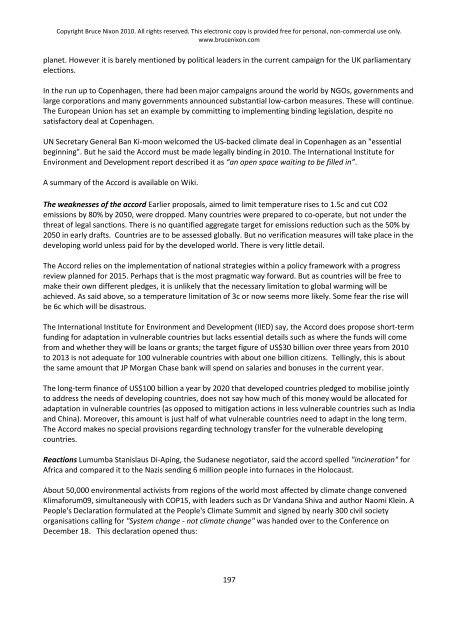A better world is possible - Global Commons Institute
A better world is possible - Global Commons Institute
A better world is possible - Global Commons Institute
Create successful ePaper yourself
Turn your PDF publications into a flip-book with our unique Google optimized e-Paper software.
Copyright Bruce Nixon 2010. All rights reserved. Th<strong>is</strong> electronic copy <strong>is</strong> provided free for personal, non-commercial use only.<br />
www.brucenixon.com<br />
planet. However it <strong>is</strong> barely mentioned by political leaders in the current campaign for the UK parliamentary<br />
elections.<br />
In the run up to Copenhagen, there had been major campaigns around the <strong>world</strong> by NGOs, governments and<br />
large corporations and many governments announced substantial low-carbon measures. These will continue.<br />
The European Union has set an example by committing to implementing binding leg<strong>is</strong>lation, despite no<br />
sat<strong>is</strong>factory deal at Copenhagen.<br />
UN Secretary General Ban Ki-moon welcomed the US-backed climate deal in Copenhagen as an "essential<br />
beginning". But he said the Accord must be made legally binding in 2010. The International <strong>Institute</strong> for<br />
Environment and Development report described it as “an open space waiting to be filled in”.<br />
A summary of the Accord <strong>is</strong> available on Wiki.<br />
The weaknesses of the accord Earlier proposals, aimed to limit temperature r<strong>is</strong>es to 1.5c and cut CO2<br />
em<strong>is</strong>sions by 80% by 2050, were dropped. Many countries were prepared to co-operate, but not under the<br />
threat of legal sanctions. There <strong>is</strong> no quantified aggregate target for em<strong>is</strong>sions reduction such as the 50% by<br />
2050 in early drafts. Countries are to be assessed globally. But no verification measures will take place in the<br />
developing <strong>world</strong> unless paid for by the developed <strong>world</strong>. There <strong>is</strong> very little detail.<br />
The Accord relies on the implementation of national strategies within a policy framework with a progress<br />
review planned for 2015. Perhaps that <strong>is</strong> the most pragmatic way forward. But as countries will be free to<br />
make their own different pledges, it <strong>is</strong> unlikely that the necessary limitation to global warming will be<br />
achieved. As said above, so a temperature limitation of 3c or now seems more likely. Some fear the r<strong>is</strong>e will<br />
be 6c which will be d<strong>is</strong>astrous.<br />
The International <strong>Institute</strong> for Environment and Development (IIED) say, the Accord does propose short-term<br />
funding for adaptation in vulnerable countries but lacks essential details such as where the funds will come<br />
from and whether they will be loans or grants; the target figure of US$30 billion over three years from 2010<br />
to 2013 <strong>is</strong> not adequate for 100 vulnerable countries with about one billion citizens. Tellingly, th<strong>is</strong> <strong>is</strong> about<br />
the same amount that JP Morgan Chase bank will spend on salaries and bonuses in the current year.<br />
The long-term finance of US$100 billion a year by 2020 that developed countries pledged to mobil<strong>is</strong>e jointly<br />
to address the needs of developing countries, does not say how much of th<strong>is</strong> money would be allocated for<br />
adaptation in vulnerable countries (as opposed to mitigation actions in less vulnerable countries such as India<br />
and China). Moreover, th<strong>is</strong> amount <strong>is</strong> just half of what vulnerable countries need to adapt in the long term.<br />
The Accord makes no special prov<strong>is</strong>ions regarding technology transfer for the vulnerable developing<br />
countries.<br />
Reactions Lumumba Stan<strong>is</strong>laus Di-Aping, the Sudanese negotiator, said the accord spelled "incineration" for<br />
Africa and compared it to the Naz<strong>is</strong> sending 6 million people into furnaces in the Holocaust.<br />
About 50,000 environmental activ<strong>is</strong>ts from regions of the <strong>world</strong> most affected by climate change convened<br />
Klimaforum09, simultaneously with COP15, with leaders such as Dr Vandana Shiva and author Naomi Klein. A<br />
People's Declaration formulated at the People's Climate Summit and signed by nearly 300 civil society<br />
organ<strong>is</strong>ations calling for "System change - not climate change" was handed over to the Conference on<br />
December 18. Th<strong>is</strong> declaration opened thus:<br />
197
















